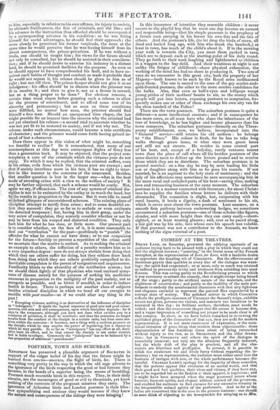POSTMEN, TOWN AND SUBURBAN.
Xanvoenos has preserved a plausible argument of SOCRATES in support of the vulgar belief of' his day that the future might be learned from omens—sneezes, the flight of birds, &c. There is something very pretty in the way in which the old sage adverts to the ignorance of the birds respecting the good or bad fortune they became, in the 'hands of a superior being, the means of heralding. Postmen much resemble birds in this respect. They, in their daily circuits, are the messengers of good or evil to thousands, yet know nothing of the contents of the pregnant missives they carry.. The ignorance of Athenian birds and London postmen is their bliss: how sympathizing and, anxious they would become if they knew the nature and consequences of the tidings they were bringing I In this innocence of intention they resemble children : it never occurs to the playful boy that he must one day become an earnest and responsible being—that his simple presence is the prophecy of a future man carrying in his breast his own fate and the fate of others. And the postman's life, (to let drop the birds of omen, all dead and buried long ago, with him who drank the hemlock,) at least in town, has much of the child's about it. If in the morning your walk is towards the City, you meet them packed in vans, which are to deposit each at the starting-point of his daily round. They go forth to their work laughing and lighthearted as children in a waggon to the hay-field. And their weariness at night is not unlike the fatigue of childhood—sheer physical exhaustion, the working of the mind has had no share in producing it. Two settiof vans do we encounter in this great city, both the property of her Majesty—both known to be such by the Royal arms emblazoned upon them. The one is sacred to the uses of the gay scarlet-and- gold-liveried postmen, the other to the more sombre candidates for the hulks. Alas, that even as bull's-eyes and lollipops tempt young prides of their mothers' hearts to sin, so the money which people will put into letters, exposing postmen to temptation, fre- quently makes one or other of them exchange his own airy van for the close tumbril of the Police !
These are the town postmen. The suburban postman is quite a different—a more intellectual creature ; and if in consequence he has more cares, as all must have who share the inheritance of the tree of knowledge, so he has higher and keener pleasures than his town compeers. The suburban postman—formerly on the Three- penny establishment, now, we believe, incorporated into the " General " service—still retains his old uniform : he belongs to "the Blues." His colour is fresh, for he has to take long walks through green lanes, or what once were green lanes and still are not streets. He resides in some central part of his beat, and, except of a holyday, rarely ventures nearer town than the place of call where all his brother postmen of the same district meet to deliver up the letters posted and to receive those which they are to distribute. The suburban postman, is in general married : on a fine day he may be, seen leading his little son or daughter along with him as he goes his rounds. If not married, he is an aspirant to the holy state of matrimony ; and the lady of his affections may sometimes be seen accompanying him in the more rural and secluded parts of his beat—saving time, making love and transacting business at the same moment. The suburban postman is in a manner connected with literature ; for about Christ- mas he supplies the families whose letters he delivers with their almanacks. The connexion is slight, but, cooperating with his rural haunts, it lends a dignity, a dash of sentiment to his air, which is never seen about the town postman. Last summer, on a smooth firm pathway between embowering hedges, we sometimes encountered a suburban postman—one of those scholar-like figures, slender, and with more height than they can carry easily—short- sighted, or at least wearing glasses ; and, ever as he paced along, a fair girl was by his side, into whose ears his speech was voluble. If that postman was not a contributor to the Annuals, we know nothing of the signs external of a poet.


























 Previous page
Previous page